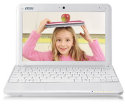Linux netbook return rates higher?
Oct 6, 2008 — by Eric Brown — from the LinuxDevices Archive — 3 views A recent interview quoted an MSI executive as saying that returns of Linux netbooks were more than four times higher those of Windows XP netbooks. However, the quote may say more about MSI's SUSE Linux implementation than the suitability of Linux as a netbook OS.
A recent interview quoted an MSI executive as saying that returns of Linux netbooks were more than four times higher those of Windows XP netbooks. However, the quote may say more about MSI's SUSE Linux implementation than the suitability of Linux as a netbook OS.
(Click for larger view of MSI's Wind U100)
The Laptop Magazine interview, which also announced that MSI is planning a new U120 version of the Linux-and Windows-compatible, Intel Atom-based Wind U100, quoted MSI Director of U.S. Sales Andy Tung as saying that netbooks returns are higher than usual. “Our internal research has shown that the return of netbooks is higher than regular notebooks, but the main cause of that is Linux. People would love to pay $299 or $399 but they don't know what they get until they open the box. They start playing around with Linux and start realizing that it's not what they are used to. They don't want to spend time to learn it, so they bring it back to the store. The return rate is at least four times higher for Linux netbooks than Windows XP netbooks,” Tung reportedly said, according to LaptopMagazine.
The quote has generated much discussion in Internet blogs. Some have pointed out that MSI has yet to ship its Linux-based netbook, so Tung's figures may actually be based on earlier MSI notebooks that ran Linux. Also, Tung was quoted as saying that his impression about returns was based in part on discussing the subject with a retailer of Asus netbooks.
Linux is not Linux is not Linux
Clearly, Tung's statement may reflect his subjective impression, rather than actual return figures. Still, it is worth noting that early netbook vendors do often rush to market with hasty Linux implementations. And unfortunately, the smaller screens and lower CPU power of netbooks means that “normal” Linux distributions like SUSE may not work very well on them.
Compounding the problem, netbook vendors often see Linux as a “low-end” option, and thus offer a reduced hardware spec on Linux models. For example, the Linux version of the MSI Wind U100 comes with only a 3-cell battery, with 512MB of RAM instead of 1GB, and no bluetooth.
Some netbook vendors, though — notably Asus and Acer — have worked closely with Linux software partners to produce well-integrated, highly usable products. The pioneering Asus Eee PC uses the Windows-like Xandros distribution, while the popular Acer Aspire One uses Linpus Linux Lite, a distribution specifically designed for netbooks. Dell's Dell Inspiron Mini 9, meanwhile, uses a version of Ubuntu specifically designed for netbooks.
Additionally, several off-the-shelf Linux distributions specifically targeted to netbooks are under development. In addition to the Linupus Linux Lite and Ubuntu Netbook Remix mentioned above, gOS has recently launched a new version of its gOS Gadgets 3.0, targeting the OEM netbook market.
Availability
The full Laptop Magazine interview with MSI's Andy Tung should be here. More information on the Wind U100 may be found here.
This article was originally published on LinuxDevices.com and has been donated to the open source community by QuinStreet Inc. Please visit LinuxToday.com for up-to-date news and articles about Linux and open source.